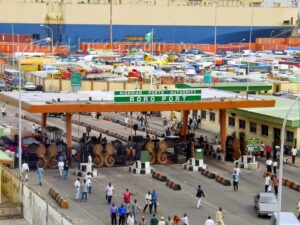Last week, the Managing Director of Nigerian Ports Authority (NPA), Mohammed Bello-Koko was quoted to have hinted of the readiness of the agency to effectively tackle all concerns raised by port stakeholders as they relate to the operation of the electronic scheduling system for trucks doing business in the port.

While giving the assurance, he had also hinted of the possibility of a rejig of the electronic call-up process, having operated the novel system for about a year
“Our resolve as management of the NPA is to ensure the goals behind the introduction of the electronic call up system is achieved”, he had said, even as he reaffirmed NPA’s believe in the contract with Messrs TTP Ltd; operators of the e call up system.
What is happening in Apapa in terms of traffic is not unexpected, given its privileged location as home to Nigeria’s two foremost ports which are currently being managed by nine terminal operators. Between the two ports (Lagos Port Complex and Tin Can Island Port) more than 65 percent of dry cargoes and about 90 per cent of the nation’s liquid (petroleum products) are handled. This is because it hosts about 45 tank farms (and still counting). These are in addition to the many banks, shipping companies/agencies, licensed customs offices, factories and numerous other businesses that are located in this port city.
We recall that on February 28, 2021, the Nigerian Ports Authourity (NPA) introduced what can be described as the game–changer for chaotic Apapa traffic. By the explanations that were given by the NPA, an electronic call-up system would be deployed to direct truck movement into Lagos ports of Tin Can and Apapa.
The NPA rested the implementation on five pillars, which were supposed to hold the operations of the electronic call up via the eto app.
According to the NPA, trucks must be called upon using the Eto electronic call-up system before they could gain access into the ports. Therefore, all trucks and their owners are expected to download the Eto App and sign-up in order to become part of the new system.
The NPA had said then that the new system “would be done transparently on a first-come-first-served basis. We have also requested for the operator to have a dashboard in front of port locations where the movement of trucks would be displayed for truckers to see their daily schedule,”
Ordinarily, this ought to have removed human intervention in the process of managing truck movement in and out of the ports. It was also expected to put an end to the problem of extortion of truckers by security operatives in charge of traffic control within the Apapa corridor.
Another pillar of the electronic call up is that, trucks must stay at designated parks; and to achieve this, some truck parks were selected. This means that, under the e-call up system, trucks that are not parked within the approved parks would no longer gain access into Lagos ports to pick cargo.
What this clearly meant was that, with the electronic call up, trucks should cease to park indiscriminately on Apapa roads and bridges. This is expected to eliminate the ugly perennial traffic gridlock that have been the lot of the port city; Apapa for so many years.
One clear condition with the use of eto and the e-call up is that a fee of N10,000 only will be paid. According to NPA, truckers are expected to pay a token of N10,000 for utilising the Eto App and to park in the truck park. The download of the App is free and truckers are only expected to make payment when they want to exit the park.
By the initial arrangement, there is no other fee to be paid by truck owners to access the port or park at the transit park.
At the onset of the e call up system in February, the NPA made it clear that consignees should drop empty containers at the holding-bay of shipping companies, from where the shipping lines are expected to be responsible for taking the empties into the port.
The electronic call-up system was expected to restore sanity within the Apapa port corridor by removing the daily traffic congestion.
This looked good on paper, and the arrangement actually worked for a while, then the unexpected began to happen, thus threatening the initial success of the e-call up.
Painfully, extortion resurfaced on the Lagos ports corridor, where the various personnel of government agency who have been drafted to the ports corridor started compromising on a larger scale.
By its own admission too, the NPA at a time acknowledged that, there were over 30 checkpoints within the Apapa and Tin Can Port axis.
Read Also: Do you think electronic call up system should be unbundled?
Even though the Lagos state government impounded many trucks for infractions, despair is gradually setting in on the part of all stakeholders, who had endured years of pains and business losses on account of the terrible vehicular traffic.
It will not be out of place to state that the whole essence of the electronic call up has been destroyed by the abuses that have resurfaced lately. It is sad that the those who took advantage of the old system have regrouped and are the same actors who are frustrating the electronic call up.
All that the NPA and TTP promised were not fulfilled, and that is why industry stakeholders say that the new system was only meant to rake-in money into the coffers of the government and fester extortion. As much as they acknowledged that there is a great improvement in traffic, they none-the-less criticize the abuse and extortion on the part of the security personnel drafted to the approaches to the ports.
But by and large, the electronic call up has been a revolution. It has changed the traffic landscape of Apapa. No longer do we have articulated vehicles on queue on the approaches to Apapa port.
Apart from the challenge of road construction between Mile 2 and Coconut on the approach to Tin Can port, the only challenge that we think the NPA should look into is the complaints of truckers about the operational modalities that are being rolled out periodically by TTP
It is not late to still sit with stakeholders. Even though the NPA and the operators of the e-call up were confident that it would be a success, events in the last 12 months have shown clearly that, a lot still needs to be done.
While not calling for the sack of TTP or the unbundling of the e- call up, both the NPA and the operators of the electronic call up should go back to the drawing board and re-strategize. The take up point may be to meet with stakeholders who are critical to the operations of the new truck call up system.
After one year, it will be appropriate to take a second look at the promises made at the onset of the new system in February 2021 and how well the system has fared since its introduction.
Kindly like us on Facebook















